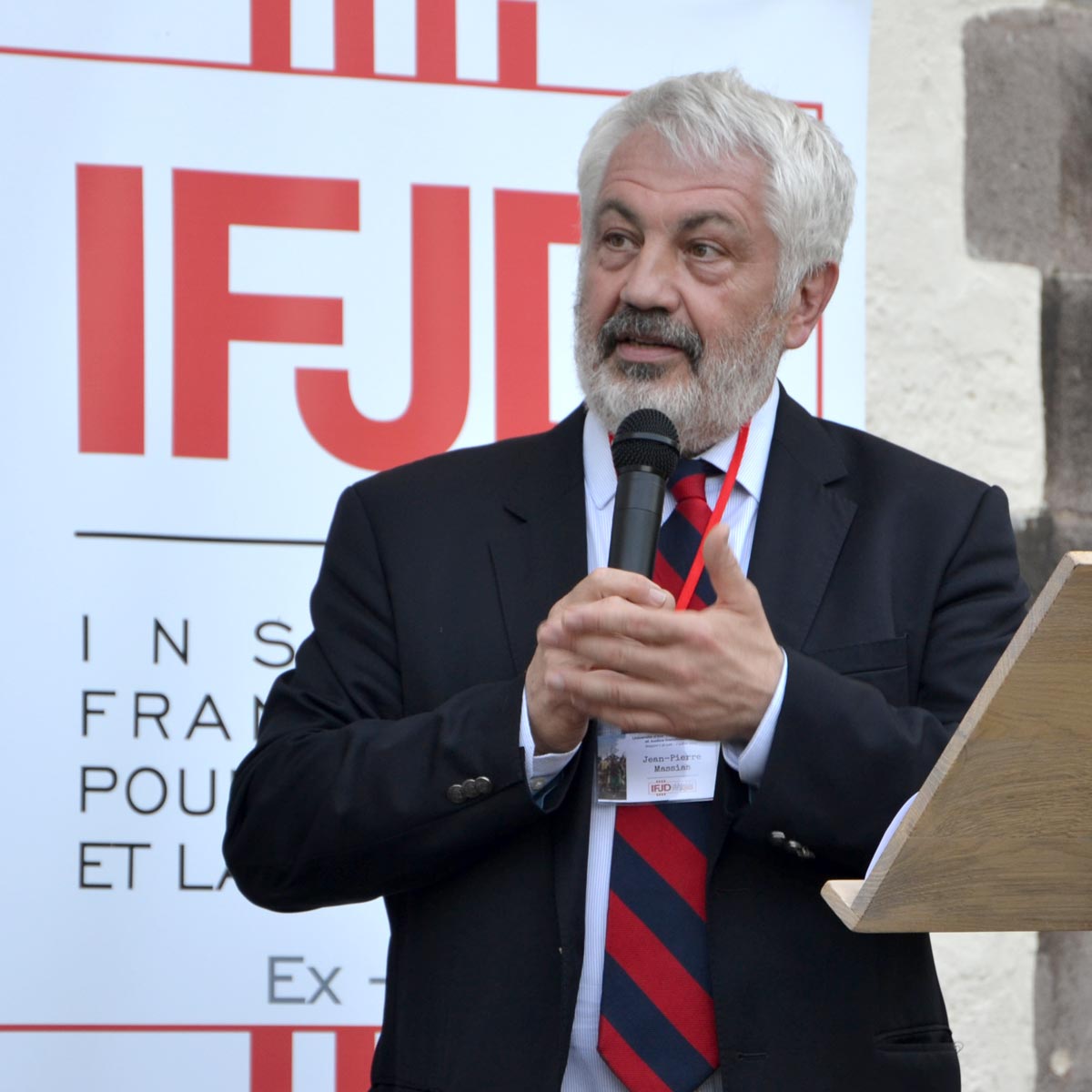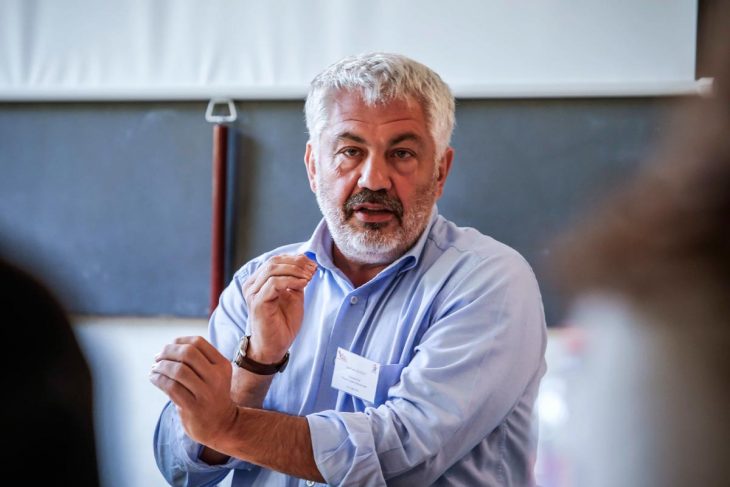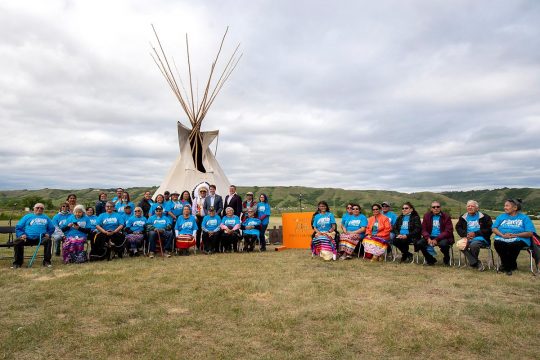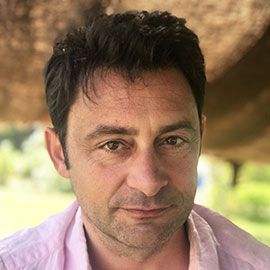JUSTICEINFO.NET IN-DEPTH INTERVIEWS
Jean-Pierre Massias
Professor of public law at the University of Pau and president of the Institut francophone pour la justice et la démocratie
Indigenous peoples' access to transitional justice remains limited, but they are energetically helping to renew it, says Jean-Pierre Massias, president of the Institut francophone pour la justice et la démocratie whose sixth summer school from 30 June to 7 July was held on the theme of "indigenous peoples and transitional justice". This expert on democratic transitions explains why the Canadian initiative sets a major precedent and why there may be an obligation on democracies to redress past injustices.
JUSTICEINFO.NET: The indigenous peoples of Canada have made quite spectacular and successful use of transitional justice to demand an end to the violations committed against them. Is that a trend?
JEAN-PIERRE MASSIAS: don't know if it’s a trend. The situation of indigenous peoples with regard to transitional justice seems to me to be marked by a form of paradox. Their history should lead them to turn to it, because they have suffered extremely serious crimes of a genocidal nature, which are old and for which they are seeking reparation even though there have never been any convictions. They are in a way the natural subjects of transitional justice, whose primary purpose is to deal now with what should have been judged before. But the examples are still few. One example is the Peruvian Truth Commission [2001-2003], which indirectly addressed the indigenous issue because the victims of the dictatorship were largely indigenous. Then, of course, there was the Canadian Truth Commission [2007-2015]. Also in Canada, the recent national survey of Aboriginal women and girls had this specific aspect. But there's not much else.
Indigenous people are extraordinarily fragile peoples insofar as they are few in number and are marginalized, any direct or indirect attack has an almost genocidal dimension because it endangers the existence of the group.
Which transitional justice mechanisms do you think are most appropriate for indigenous peoples?
First of all, we need to ask whether indigenous people constitute specific victims. I think this summer school made it possible to answer yes. Because, overall, the nature of the attacks they suffer is not only the physical violence of mass destruction but also attacks on their culture and gender-based violence. As these are extraordinarily fragile peoples insofar as they are few in number and are marginalized, any direct or indirect attack has an almost genocidal dimension because it endangers the existence of the group. So they are specific victims.
On the question of appropriate mechanisms, we see that it is rather those within the scope of the so-called post-transitional justice system, which relates to acts so old that the question of criminal prosecution of perpetrators is impossible. We are thinking of specific forms of truth commissions. We are also thinking of public apologies and all the processes of progressive reconstruction that the Guatemalan Truth Commission [1994-1999] called policies of "redignification" [restoration of dignity]. But above all, guarantees of non-repetition which, unconsciously, are often considered a luxury in transitional justice policies. Yet they are fundamental, because without them the wiping out of people continues. We are dealing with peoples who, for the most part, are in a situation of potential extinction.
With indigenous peoples, we see the arrival of truth commissions without transition -- there is no transition in Canada, there will be no transition in Finland where the Sami people are setting up a commission -- with the sole purpose of addressing the indigenous issue.
Does the Truth Commission in Canada seem to you to renew the field of transitional justice?
I think so. The origin of transitional justice and international criminal justice is the desire to fight impunity, by doing what we can. In this generation, the technical solution is the result and extension of political will. We look for the most suitable or least unsuitable tool for this purpose. It seems to me that today we have reached a second stage, where the tool is an expression of will. As we see in many transition societies, the transitional justice option is no longer really an option, it is imposed. It has become a kind of immediate language of the protagonists in the conflict, who know very well that this is expected and who know very well that there can be important sources of funding for the establishment of these systems. So here, the tool precedes the will. Sometimes it even takes the place of will... and sometimes it hides the lack of will. We are in this phase of automatic response. We see it in the use of recurrent language on reconciliation, trauma, resilience, which is a language too common not to be suspect.
With indigenous peoples, we see the arrival of truth commissions without transition -- there is no transition in Canada, there will be no transition in Finland where the Sami people are setting up a commission -- with the sole purpose of addressing the indigenous issue. It goes back a long way, back several centuries. It seems to me that this is a form of transitional justice without transition, a form of transitional justice of democratic consolidation that aims to repair the mistakes of the past and allow the democratic state to become more democratic, or truly democratic.
We see this form of transitional justice developing in stabilized democratic societies for specific problems, and trying to find a solution through truth, recognition, reparation and non-repetition.
But how can a State be forced to do this work if its survival is not threatened?
By social pressure. Certainly in Canada, there has been a court decision, complaints from children who went through residential schools and their heirs. In Finland, it is the State that has accepted the request submitted by the Sami community. This requires two things: that indigenous people are sufficiently structured and organized to make the request; and that the State has the capacity to accept it politically and socially.
Basically, the truth commission becomes a long-term transitional justice instrument to deal with issues of remembrance. There is, in some ways, a recent precedent in France concerning miners made redundant after the great strike of 1948. In 2014, the French parliament passed a law on compensation, recognition and establishment of a commission, the objective of which is to rewrite history for school textbooks and reassess the violations suffered by these miners. This commission is somewhere between an expert commission and a truth commission, with victims and their heirs being heard. We see this form of transitional justice developing in stabilized democratic societies for specific problems, and trying to find a solution through truth, recognition, reparation and non-repetition. Justice is missing. Because it's impossible.
The transitional toolbox is therefore finding new uses. You even mentioned "DIY" in one of your interventions. Why?
These forms borrow from Nelson Mandela's "DIY" - in the very noble sense of the word. When faced with the amnesty which he refused and the justice which he could not do, he invented a model that was a form of justice particularly adapted to mass crimes. The commissions take into account the true nature of the violence, which is not the sum of individual manifestations of violence, but [corresponds to] a societal problem that manifests itself in various individual actions. A commission is better able to manage a growing societal problem than a court. We are in the collective, we are in the institutional, we are in the structural, we are in the social. The commission does not accuse people, or only as a way to raise the real problem and the real dimension of the problem.
However, we should not think commissions are perfect. This model has at least two flaws: commissions absolutely need the State; victims, as individuals, are frustrated. On the other hand, the social body is better served.
It is because there is a desire for democratic consolidation that there is transitional justice. It is not transitional justice that triggers it. It contributes to it, it improves it, but it is only the second or third stage of the process, and no more.
Isn't it also a way of "smoothing over" a conflicted past?
This is a criticism of transitional justice in general, which consists of saying that it is small-scale justice. But this presupposes that the victim has access to criminal justice, which is rarely the case. I think we have to admit that transitional justice is neither an exact science nor a moral science. From this point of view and to put it simply, it is based on two instruments, the truth commission and the court, each of which has its disadvantages and shortcomings. But what the Sámi or the native Canadians are telling us is that, basically, they use the truth commission because we do not have a court, or the court is not efficient. We do what we can and all this remains subject to the will of the State. It is because there is a desire for democratic consolidation that there is transitional justice. It is not transitional justice that triggers it. It contributes to it, it improves it, but it is only the second or third stage of the process, and no more.
For these peoples, what does this solution bring that is new?
This renews collective action. The number of people who can go before a commission is very large. It gives a collective meaning to the notion of victim, and it goes beyond or partially overcomes all the traditional limits of access to justice, such as social status, education, geography and minority situations. Establishing a truth commission for indigenous people means opening access to a population that is socially disadvantaged. Indigenous peoples represent 5 per cent of the world's population and are among the most disadvantaged. When we are told that the main victims of violence in Peru are "illiterate indigenous peasant women", it is clear that a commission specifically aimed at indigenous people will enable people to seek justice who do not traditionally have the means to do so. It also allows them to use indigenous languages, indigenous judges, indigenous concepts.
The new model is the Canadian Commission. It is the contemporary counterpart of the South African model. Now I think we need to talk about the Canadian precedent
So it only works in rich, democratic countries?
For now, it has worked in one rich, democratic country. The new model is the Canadian Commission. It is the contemporary counterpart of the South African model. Now I think we need to talk about the Canadian precedent, and that perhaps this is a new path and new progress in the democratization of societies. Presumably, if similar commissions are implemented in Finland and Norway [for the Sami peoples], there are no societal barriers that will prevent them from functioning. The South African model also worked because it operated in a country with significant economic resources.
Is this impossible under an authoritarian regime?
Indigenous people are subject to the same difficulty as all people living under oppression. And repressive regimes can be even more repressive because they are indigenous. For there to be transitional justice, the regime must stop being authoritarian and, in a second stage, agree to recognize the rights of minorities.
What about plundering by multinationals?
Here, we are more in jurisdictional justice, even if the political phenomenon to which it refers is confiscation by multinationals. That is to say the dominant oppressive actor against indigenous minorities will be the multinational, with or without the State. It is a current process and, when it is current, we should be able to take legal action. But it also needs social mobilization and international solidarity.
And to deal with the notion of ecocide?
There was a lot of talk about it during the summer school. If ecocide is linked to the destruction of the natural living environment of indigenous peoples, which results in their disappearance as individuals and as a people, then we are in a genocidal practice. The disappearance of forests for peoples we know will not live as they did before outside the forest - or who will not survive at all - can be part of a mechanism for the destruction of a human group. It's the way it is done that is different.
The destruction of a culture can lead to the destruction of a human group without necessarily causing the physical destruction of its members. We do not kill them, but we only have to look at the state of certain populations to see that there is destruction.
The Canadian commission redefines the notion of genocide. What do you think of that?
When the commission says that violence against indigenous girls and women is a specific form of genocide, it is not wrong. Maybe it won't go to court. Perhaps this goes very far beyond the definition of the 1948 Convention. But despite everything, it can bring about changes in the law and in global awareness of the social phenomenon in question.
Moreover, the notion of cultural genocide, which is underlying, is a notion that seems obvious to me. The destruction of a culture can lead to the destruction of a human group without necessarily causing the physical destruction of its members. We do not kill them, but we only have to look at the state of certain populations to see that there is destruction. Turning a population into a socially assisted group, disadvantaged, suffering from suicide, obesity and domestic violence, is a political crime.
Aren't these new forms of justice first and foremost projects for society?
I think we need a social project. It is the project that creates the [truth] commission. The project is to integrate the indigenous people but to integrate them in a different way. This brings us back to the question of what would be a society in which they were integrated. The first answer is obviously to put an end to considering them legally, politically and socially as second-class citizens, with reduced life expectancies, reduced social levels and reduced access to positions of power.
But that is not enough. In addition to this right to equality, a right to difference must be proclaimed. This means that future democracies must be able to integrate minorities not only by granting them collective rights, but that the collective rights of these minorities must guarantee them the possibility of being different. It is a multiplied right to difference: the right to equality, protection, the right to a different justice system and different beliefs. This raises questions about the integration capacity of our democratic models. I believe that transitional justice can only work if we have decided to go in that direction. It does not make much sense to create a truth commission if the objective is just to acknowledge the harm done to an indigenous population but not to improve its lot and allow it to become what it should never have ceased to be.
I think that the truth commission could be a privileged instrument for dealing with France's colonial history.
Could former colonial power France get started here?
I think it's a must. I think that the truth commission could be a privileged instrument for dealing with France's colonial history. We can see the intellectual mechanism that could be put in place: the State is not guilty for what it did in the past, but the Republic is responsible for not repairing it. There may be an obligation on democracies to redress past injustices.
There are some hopeful signs. The 1948 miners' strike commission was mentioned. We can also mention the Audin case. The President’s declaration acknowledging [in 2018] France's responsibility for the assassination of Maurice Audin is both a historical signal and a beginning -- it opens up possibilities for research. We can mention the restitution of stolen works of art in the colonies. This provides a form of comfort. I don't know if we're going to do it more globally. In any case, if we want to do it, we know how to do it. If you are a democrat, you can keep a much better relationship with a group to whom you behave well than if you behave badly. I think that's what we have to believe. Transitional justice is an instrument for regulating these relationships.
Interviewed by Franck Petit.
 JEAN-PIERRE MASSIAS
JEAN-PIERRE MASSIAS
President of the Francophone Institute for Justice and Democracy (IFJD), he is a law professor specializing in democratic transition processes and transitional justice mechanisms. In 2015-2016, he participated in the training of members of the Burundi TRC and supervised several research and training programs in the field of transitional justice, such as the annual IFJD summer university created in 2014. He also directs several field projects, notably in the Central African Republic and the Democratic Republic of Congo, many of which are devoted to the treatment of war rape in wartime and carried out in collaboration with the Dr. Mukwege, Panzi and Pierre Fabre Foundations.







